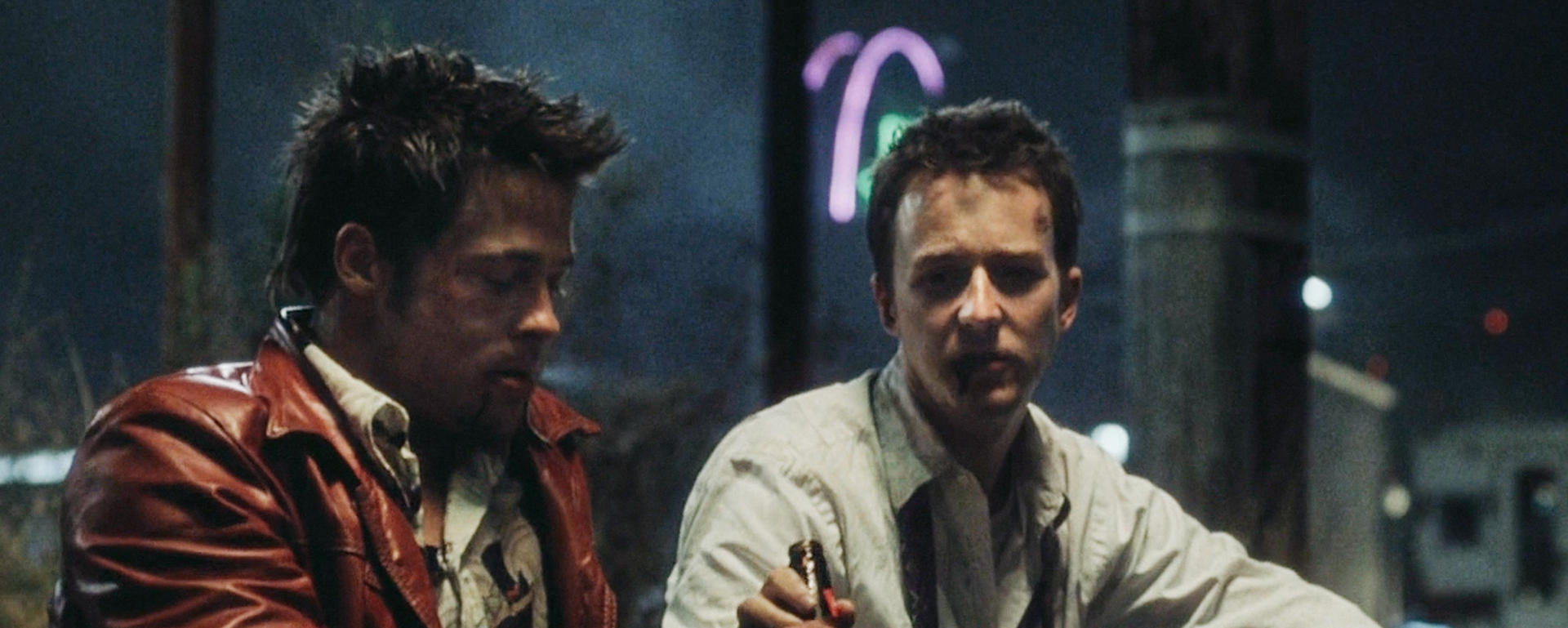
Fight Club
"The first rule of Fight Club is: 'You don't talk about Fight Club'. The second rule of Fight Club is: "You don't talk about Fight Club". Thus runs the tagline for this David Fincher film submitted to the BBFC in 1999.
Based on the novel by Chuck Palahniuk, the film had caused something of a sensation at the Venice International Film Festival when some critics reacted strongly to both the film's thesis and its level of personal violence, while others praised its imaginative approach and strong performances from Edward Norton and Brad Pitt. In particular, Alexander Walker, then veteran critic of the London Evening Standard, who had seen it in Venice, inveighed against the film as "a toxic experience ... an inadmissible assault on personal decency ... and on society itself. It resurrects the Führer principle. It promotes pain and suffering as the virtues of the strongest. It tramples every democratic decency underfoot."
There was much debate about the film's subject matter – it was seen as a blackly comic satire of capitalism and consumerism; as an exploration of the loss of male identity in a feminised society, and as about violence as a way in which the powerless male can reassert himself against the corporate world he inhabits. Whatever the meaning, the film presented sequences in which men challenged other men to beat them up, and then allowed their opponents to do so without any resistance from their ‘victims’, the result being scenes of strong, and sometimes bloody, violence.
The film, which came with an 18 request from its distributor, 20th Century Fox, was seen by most of the BBFC's examiners, and also by the BBFC Director, Robin Duval, his Deputy, and the President and Vice-Presidents, provoking a wide range of opinion. While BBFC examiners found the film stylish and challenging, and some felt an uncut 18 was acceptable for this adult viewing experience, there were concerns under the BBFC Guidelines of the time about the glamorisation of violence and the potential for encouraging an interest in organised bare-fist fighting. Neither the novel nor the film condoned brutal fighting, as the conclusion of the narrative makes clear.
After extensive consideration, the final decision was taken to require cuts under the Guidelines of between six and seven seconds to two scenes - both of which, it was felt, focused on the pleasures of beating the faces of helpless victims to a bloody mess. The first cut was in the scene where Lou fights Tyler Durden in the basement of his club, and consisted of an instruction to reduce the heavy and explicit punches to the head that end the fight. Reductions in violence were also required in the scene where the narrator fights a blond man of whom he is jealous – sight of blows to the face at the end of the fight were removed. In practice it is difficult to detect where the cuts were made, but it was felt that the effect was successful in reducing the sense of sadistic pleasure in inflicting violence. With these cuts made, an 18 certificate was given. The BBFCinsight read ‘Passed 18 for occasional strong violence’. The film had been classified uncut at R in the United States.
The cuts were repeated in April 2000 for the video version. Meanwhile, the BBFC had been working on researching and drawing up a revised set of Guidelines, but these were not published until September 2000. In 2005, with a new set of Guidelines and a new BBFC Director, all cuts were waived to pass a new widescreen DVD submission at 18.
The new BBFC Guidelines established the principle that adults should be free to choose their own entertainment, within the law, and it was considered that there was nothing in Fight Club that was in breach of UK law, or felt to be harmful.
And did the film encourage young men to set up their own fight clubs? There were some press reports from the US which suggested that fight clubs had been set up as a result of the film, but concerns about similar activity in the UK seem to have been unfounded.